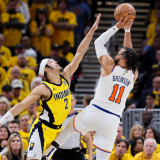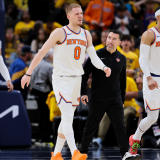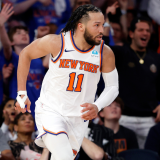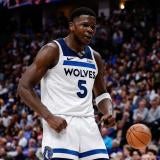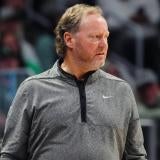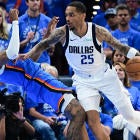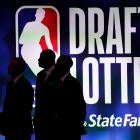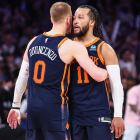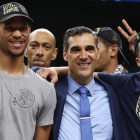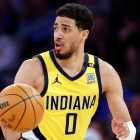Slow starts are nothing new to the Utah Jazz. In 2017-18, Donovan Mitchell's rookie season, they were 19-28 on Jan. 2. They finished 30-11 and made it to the second round of the playoffs. In 2018-19, they were 21-21 on Jan. 9 and had spent more than 90 percent of the first three months at or below .500. They went 29-6 and made the playoffs as the No. 5 seed.
The start wasn't quite as slow this season, but it wasn't exactly fast -- 12-10 on Dec. 4 after a 25-point loss to the Lakers. The offense was ranked 23rd in the league. Even the defense, used to being at or near the top of the league, was barely inside the top 10.
"I would love to start fast and finish fast,"Jazz coach Quin Snyder joked before Utah's loss at Miami two days before Christmas. "I think the interesting thing about our team -- I try not to pay too much attention to our record -- but I think there is this sense we've started slow. It may be relative to expectations. I think we're starting [like a team] that has eight new players. There's been a lot of adjustments.
"In previous years we had a lot of turnover," Snyder continued. "In [2017-18] we were relying a lot on a rookie [Donovan Mitchell], so there's going to be some volatility there. There's so many things that play into it. I understand the narrative. I look at [the slow starts], too. Hopefully we can play better in January than we did last year, and that'll be a step."
Suffice it to say, Utah has -- again -- taken that step. Currently riding a 10-game win streak and having won 16 of their last 19, the Jazz are tied with Denver for the second-best record (28-12) in the Western Conference entering play on Thursday.
A couple major things have changed. The Jazz sent Dante Exum and two second-round picks to the Cavs in exchange for Jordan Clarkson, who has been terrific since his arrival. The Jazz, in fact, have yet to lose a game with Clarkson, who's averaging 15 points off the bench through his first 10 games and has been a legitimate go-to player down the stretches of tight games.
Also, Joe Ingles, who started the season on the bench to make room for Mike Conley, is back in the starting lineup, and to say he's been on fire would be an understatement. Since Dec. 4, the night he replaced the injured Conley, Ingles is averaging 15.4 points on a blistering 52.5 percent from deep.
One of the best pick-and-roll players nobody ever talks about, Ingles' usage rate has gone up by almost 40 percent as a starter. Over the past six weeks, the Jazz are plus-10.8 point per 100 possessions during his minutes, which is the best mark on the team. Perhaps thinking Ingles was going to thrive on the bench was an ambitious hope in the first place. He's a player who gets better with better players around him.
Ingles is especially adept at slow-playing his pick-and-roll decisions, staying at a moderate pace, almost creeping downhill, while waiting for the defense to either commit to him or stay in a state of indecision. If they do the latter, he finishes with old-man scoop shots and runners and everything in between; if they commit to him, he's a great -- not a good, but a great -- kick-out passer to shooters.
But that only works at an elite level if the guys on the perimeter are elite options. Otherwise Ingles gets all the attention, and again, he's not built to just be a go-get-buckets-against-any-defense scorer. That role suits Clarkson. Getting people in the right places is one part of transitioning from a good team to a great team. Utah has done that.
All told, since the Conley-Ingles flip in the first five, Utah's offense has gone from 23rd to No. 1 overall, scoring 116.5 points per 100 possessions with the best team 3-point shooting percentage in the league, per NBA.com and Cleaning the Glass -- which doesn't factor in garbage time and end-of-quarter heaves. Utah is also shooting a lot more 3s than it was in the early part of the season.
It's easy to pin Utah's early offensive struggles on Conley, who's missed 18 of the last 19 games with a hamstring injury that he re-aggravated in the one game he tried to return. It's been a nightmare season for Conley -- by far his worst campaign since his first year in the league by just about every statistical measurement.
Snyder talked about the differing dynamics of Conley playing his whole career with a pick-and-pop-oriented center in Marc Gasol to now having to find two-man chemistry with Rudy Gobert, who's a roller. Conley has also never been in a situation where he's not the clear No. 1 perimeter player. In Utah, he has to balance letting Mitchell run the show.
In a broad sense, not having to deal with that delicate balance with Conley out has clarified Utah's offensive attack. The ball is in Mitchell's hands -- where it should be. He's the best player who creates the most offense and draws the most defensive attention. The theory that Conley could relieve Mitchell of some of that burden sounded good, and to some degree it remains true, but it's sort of like the Lakers wanting Rajon Rondo, in theory, to relieve LeBron James' offensive burden.
It doesn't take long to realize you're complicating the obvious.
Give the ball to your best player and let him rock.
That's not to say Conley isn't a better player than Rondo at this point. He is. Still, it's the opportunity cost of anyone on the Jazz, let alone a guy shooting a career-low 36 percent from the field, taking possessions away from Mitchell.
Statistically, Mitchell's usage rate is nearly identical to what it was when Conley was playing, and his scoring output has remained largely unchanged; it's been Ingles and Bojan Bogdanovic assuming more responsibility. But there's a less-questionable stylistic and hierarchical clarity to Utah's attack, which was still being massaged as Conley stumbled through his opening few months in Utah, with Mitchell in charge and everything trickling down from there.
The Jazz are full of competent passers and they still move the ball well. They're not giving it to Mitchell and getting out of the way like the Rockets do with James Harden. They are a collectively forceful, downhill offense. They drive and kick as well as any team in the league. Even Gobert is starting to comfortably find corner shooters on short rolls. Suddenly the Jazz, who were always the team with an elite defense lacking for offensive firepower, are loaded with shooting and scoring options.
Georges Niang is shooting just under 45 percent from three. Royce O'Neale is shooting 44 percent. Ingles is at 43 percent and Bogdanovic 41 percent. Bogdanovic in particular has been fantastic all season. Not nearly enough people realize how great he is as a three-level scorer and legitimately one of the best shooters in the world. He curls off screens, attacks downhill and finishes strong in traffic as well as just about anyone.
In a previously sum-is-hopefully-greater-than-the-parts Utah system, Bogdanovic is a true No. 2 who can carry the team like a No. 1 any given night, which is not a luxury Mitchell has had alongside him at any point in his career. Bogdanovic should be an All-Star, though the West is probably too loaded for him to actually receive that honor.
The point is: The Jazz are a deep, rounded offensive team even with Conley out. Scouts who've spoken with CBS Sports expect Conley to remain in the starting lineup when he returns, but there's no way Ingles is going anywhere. O'Neal is the likely candidate to move to he bench, and suddenly alongside Clarkson, Niang, Tony Bradley and Emmanuel Mudiay (who is finally a contributing player on a good team), Utah's second units are formidable.
Still, it comes back to Mitchell, who jumps to a 32.5 usage rate in fourth quarters -- where he's scoring a 6.7 points per game, good enough for 10th in the league. All told, Utah's offense in No. 9 in fourth-quarter efficiency and No. 6 in clutch efficiency, meaning games within five points with five minutes or fewer to play. In such clutch situations, the Jazz have recorded a league-best 18-6 record.
In Utah's last victory over Brooklyn, Mitchell was 3 for 12 from the field before taking over down the stretch. He is a relentless attacker, strong, acrobatic finisher and an ever-improving 3-point shooter. When he gets to his spot in the mid-range, which he does pretty much at will, he's deadly. Meanwhile, Gobert is again establishing himself as a Defensive Player of the Year frontrunner.
The only qualification to all this success Utah is having is that during this 16-3 run, they've only played four teams with a winning record, and they've lost to three of them. In other words, 15 of their last 16 wins have come against sub-.500 teams. That's the schedule evening out and Utah is taking care of business, which is what good teams do against inferior opponents.
But they've done that before with hot stretches in the regular season only to fall short in the playoffs on account of not enough offense. Utah GM Justin Zanak was honest about the team's previous shortcomings when he spoke with me earlier this season.
"The last six years we've built a competitive team that was very good, but the playoff results told us we weren't great," Zanik told CBS Sports. "We knew we needed to get better in some specific areas. We wanted to add some spacing and shooting, and I think just more offensive versatility."
That's where this regular-season run feels different than the last two years. Zanik and Dennis Lindsey went out and got the pieces the Jazz needed, and that's with Conley doing next to nothing relative to his expected production and efficiency. Conley is more than capable of turning that around whenever he returns, and this initial phase of struggle can become an afterthought.
You add Conley at his normal levels of output to what Utah has established in his absence, and suddenly it's not difficult at all to envision the Jazz being a serious problem in the playoffs. You don't know how the seeds are going to play out. There's a decent chance the Lakers and Clippers face each other in the second round.
As of Thursday, the Jazz would play Denver in the second round. Obviously that would be a series they could reasonably win, just as they could reasonably beat any other team outside of Los Angeles. And then you take your chances against the big boys in the conference finals. At least now it feels like the Jazz have the firepower to pose a real threat.








